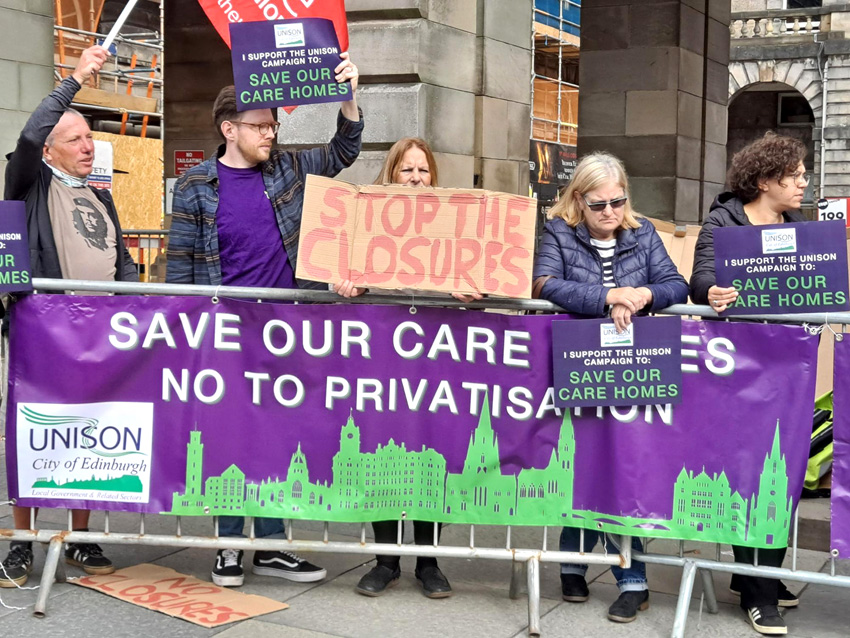THE NHS in Scotland is ‘on the brink’ as A&E hospital waiting times are the worst since records of them began, the Royal College of Emergency Medicine (RCEM) has warned.
The situation in Scotland’s accident-and-emergency departments is ‘unsustainable’ and ‘cannot continue,’ the RCEM said, as the percentage of people seen within four hours dropped to its lowest level since these records began in 2015.
Just 76.5 per cent of people were seen within four hours in the first week of August – but the Scottish Government target is 95%.
And at the same time the number of visits in this week dropped by almost 3,000, to 25,582.
Dr John-Paul Loughrey, vice-chair of RCEM Scotland, said the situation was becoming ‘increasingly challenging’ as departments had to manage high demand with fewer beds and fewer staff.
‘The workforce is facing this ongoing reality every day, ensuring they deliver high-quality effective care and that all patients are safe,’ he said.
‘These pressures are unsustainable and cannot continue. There is a misconception that as life has returned to normal, so too have hospital services, but the health service has been continually on the brink for some time.
‘It is the hard work and dedication of staff that keep it from going over despite many facing burnout, exhaustion, stress and moral injury.’
Dr Loughrey has called on the Scottish government to ‘recognise what is really going on, on the ground, the challenges staff face day to day’, and to support the NHS and its workers.
He warned the NHS could slip ‘over the brink’ if ongoing pressures were not tackled, at a cost to patient health and safety.
That comes amid reports, from health boards across Scotland, that hospitals are struggling to cope with high demand and high levels of staff absence.
Judith Park – director of acute services in NHS Lanarkshire, where waiting times are the worst – said pressure on hospitals was ‘showing no signs of easing’.
‘We continue to see exceptionally high numbers of people attend A&E, including many who attend for conditions that would be best treated elsewhere,’ she adds.
Meanwhile the Scottish Conservative shadow public health minister Dr Sandesh Gulhane has also had to label the situation a ‘fully-fledged crisis’, and went on to warn: ‘A summer of inaction and delay is harming frontline services.’
And at the same time Health secretary Humza Yousaf has said that people visiting A&E are ‘much sicker and require higher levels of care’ than before. ‘Our NHS staff have faced unprecedented pressures over recent weeks,’ he also warned.
‘They work tirelessly and consistently to respond to the pandemic, whilst continuing to provide vital treatment and optimal patient care. We are in daily contact with every board and are monitoring the situation closely.
‘Hospitals are reporting increased levels of people attending A&E who are much sicker and require higher levels of care.
‘Weekly performance is impacted due to a range of challenges, including high attendances, staffing pressures due to isolation and annual leave, and a continued requirement for infection control precautions now affecting the time people need to spend in A&E.’
He was then able to conclude: ‘The boards are in the process of recruiting additional staff with this funding – and we expect to see an impact of our rapid action in the coming weeks.’
- Meanwhile the top floor of a Dorset department store is being converted into an NHS clinic in a bid to reduce waiting lists growing throughout the pandemic. University Hospitals Dorset (UHD) is creating the hub in Beales in Poole, which will see about 130 patients a day.
Services will include breast screening and diagnostics for orthopaedics, ophthalmology and dermatology.
In June there were more than 110,000 people on NHS waiting lists across Dorset, including 82,000 at UHD.
Ashleigh Boreham, the deputy director of design and transformation at Dorset Clinical Commissioning Group, described it as a ‘national first’.
‘Using retail space is going on elsewhere in the country, but to work within an existing retail space and create something built simply for the outpatients, for diagnostics and assessment, is quite different and I think it is a first,’ he said.
He added that the project had built upon ideas used to build Nightingale Hospitals and vaccination centres in repurposed buildings.
And Mark Mould, the chief operating officer of University Hospitals Dorset, said: ‘Last year our hospitals had to respond to the rise of Covid-19 and completely re-design our services and estate across our hospitals.
‘This meant we had, very reluctantly, to cancel many appointments. Within social distancing guidelines, our hospitals aren’t going to be able to tackle the subsequent rise in waiting lists, so we needed to think big to deal with the problem.’
The department store, within the Dolphin Centre shopping mall, is one of 23 that closed after retail chain Beales fell into administration, but the Poole branch reopened in August last year under new ownership.
The clinic, which will be run by up to 30 staff and 21 volunteers, is expected to see its first patients in November or December.
University Hospitals Dorset NHS Foundation Trust manages the three main hospitals in Bournemouth, Poole and Christchurch.
- Commenting on new just-published figures from NHS England showing that waiting lists for treatment are at an all-time high, Unison’s deputy head of health Helga Pile warned:
‘The NHS is facing a double whammy of record demand and record waiting lists. That means the already exhausted and demoralised workforce is staggering up a mountain that just keeps getting higher.
‘The government must invest now to retain existing staff and attract sufficient new recruits over the next few years.
‘That means improving pay and funding more support for staff well-being. Without comprehensive action to deal with understaffing, waiting lists will continue to spiral.’
